MILEI IS A FASCIST NOT A LIBERATRIAN
Milei's office condemned the protests, calling the demonstrators "terrorists" who were "attempting to carry out a coup d'état" by disrupting Congress.
DPA
Thu, June 13, 2024

A demonstrator jumps and chants in front of the police line that prevents them from advancing toward the National Congress. The Senate Chamber of the Argentine Congress is debating Javier Milei's Ley Bases, which has already been approved by the Chamber of Deputies, while hundreds of thousands of demonstrators are protesting in the streets and there are confrontations and repressive acts by the security forces. Santiago Oroz/SOPA Images via ZUMA Press Wire/
Demonstrators and police clashed outside Argentina's Congress on Wednesday as senators passed a controversial reform package to privatize several state entities and introduce tax breaks for large investors.
The package was approved by the slimmest of margins, with 37 voting in favour and 36 against.
The deciding vote was cast by Vice President Victoria Villarruel, who as Senate president was able to prevent a stalemate by voting in favour, local media reported.
Outside, hooded demonstrators hurled stones and incendiary devices at officers in Buenos Aires, while police deployed batons and tear gas. Several cars went up in flames and around 20 suspects were arrested, according to broadcaster TN.
The office of Argentina's far-right, libertarian President Javier Milei congratulated security forces in a post on X for their "excellent actions in repressing" what it said were "terrorist groups" who had allegedly been attempting a "coup."
It later posted that the approval by the Senate was "a victory for the Argentinian people and the first step towards restoring our greatness." Due to numerous amendments, the legislation now returns to the lower hose for debate and another vote.
The reform package put forward by Milei's government provides for the privatization of several state-owned companies, tax breaks for large investors and labour market and tax reforms, among other things.
The left-wing opposition and social movements slammed the package as neoliberal and unfair, and the government has had to significantly curtail its proposals to be able to get backing in parliament.
Argentina has been gripped by a severe economic crisis for years. Annual inflation recently skyrocketed to almost 290%, one of the highest levels worldwide.
Milei's government recently cut thousands of jobs in the public sector, reduced subsidies and wound up social programmes, triggering demonstrations.
Critics say Milei's harsh austerity programme is plunging many people into poverty and is putting the country's future at risk.
Around 56% of people in the once prosperous country live below the poverty line, according to the Pontifical Catholic University of Argentina.
The second largest economy in South America suffers from a bloated state sector, low industrial productivity and a large shadow economy that deprives the state of much tax revenue.

A woman looks at the camera through the glass of a cafe, while being watched by a policeman on the other side. The Senate Chamber of the Argentine Congress is debating Javier Milei's Ley Bases, which has already been approved by the Chamber of Deputies, while hundreds of thousands of demonstrators are protesting in the streets and there are confrontations and repressive acts by the security forces. Santiago Oroz/SOPA Images via ZUMA Press Wire/dpaMore

Argentine National Gendarmerie forces clashes with protesters. The Senate Chamber of the Argentinean Congress is debating Javier Milei's Ley Bases, which has already been approved by the Chamber of Deputies, while hundreds of thousands of demonstrators are protesting in the streets and there are confrontations and repressive acts by the security forces. Santiago Oroz/SOPA Images via ZUMA Press Wire/dpaMore

Argentine National Gendarmerie forces beat up anti-government protesters. The Senate Chamber of the Argentine Congress is debating Javier Milei's Ley Bases, which has already been approved by the Chamber of Deputies, while hundreds of thousands of demonstrators are protesting in the streets and there are confrontations and repressive acts by the security forces. Santiago Oroz/SOPA Images via ZUMA Press Wire/dpaMore

A protester peeks out from behind the banners. The Senate Chamber of the Argentine Congress is debating Javier Milei's Ley Bases, which has already been approved by the Chamber of Deputies, while hundreds of thousands of demonstrators are protesting in the streets and there are confrontations and repressive acts by the security forces. Santiago Oroz/SOPA Images via ZUMA Press Wire/dpaMore
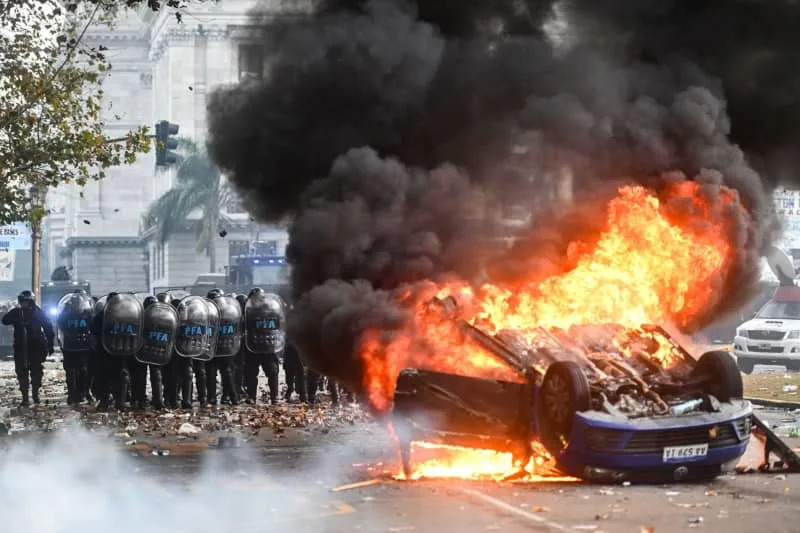
A Volkswagen car burns in front of Congress during a protest against the reform plan of President Milei's ultra-liberal government, which is being debated in Congress. Among other things, the plan provides for new regulations for high investments and a more flexible labour market. Fernando Gens/dpa
Milei's radical overhaul passes Argentina's Senate after protesters clash with police
ISABEL DEBRE
Updated Thu, June 13, 2024





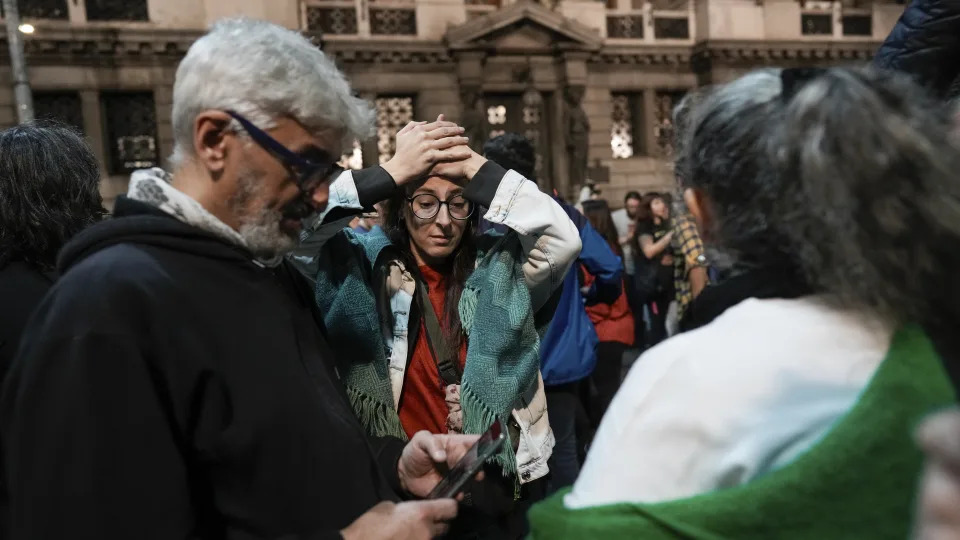


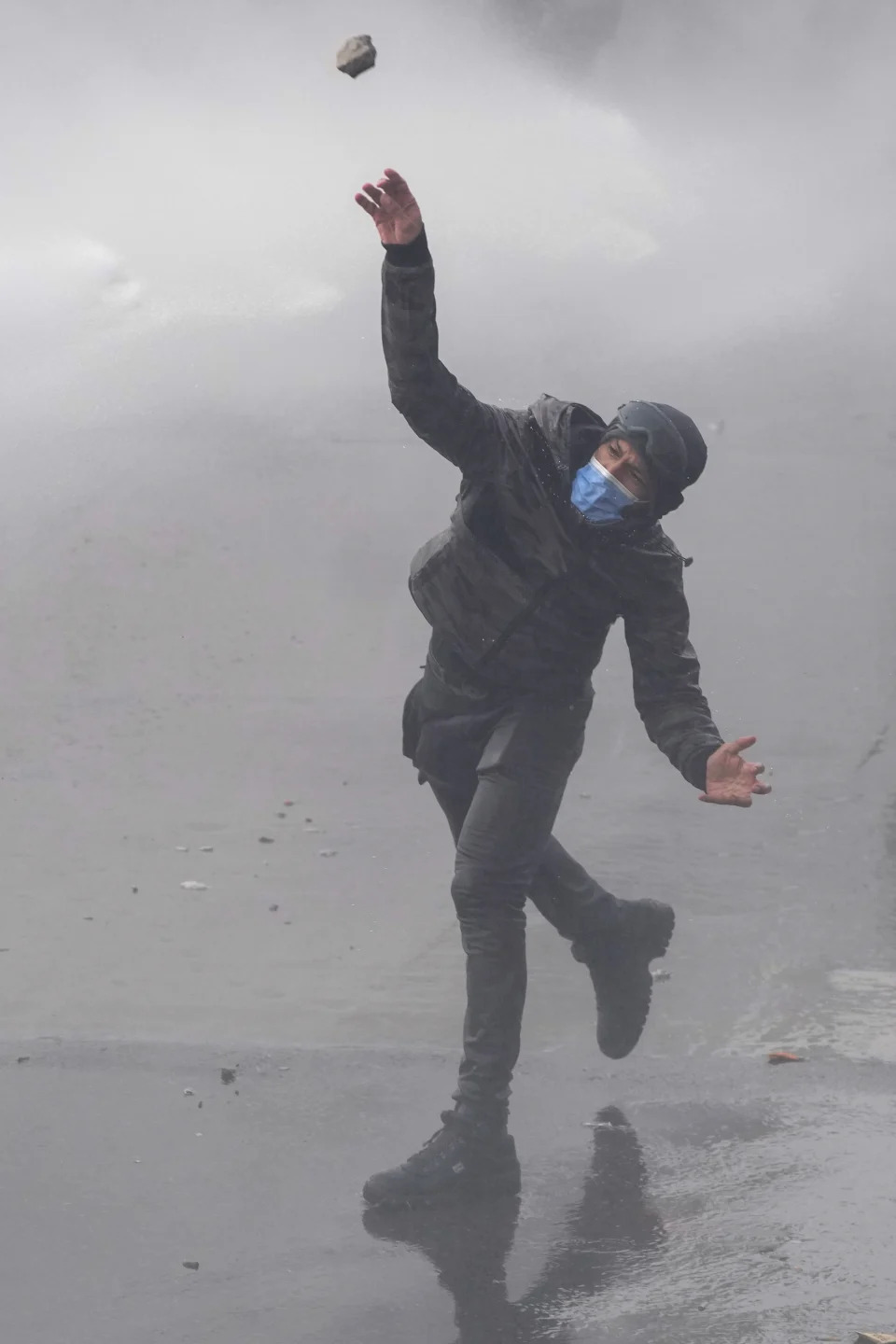
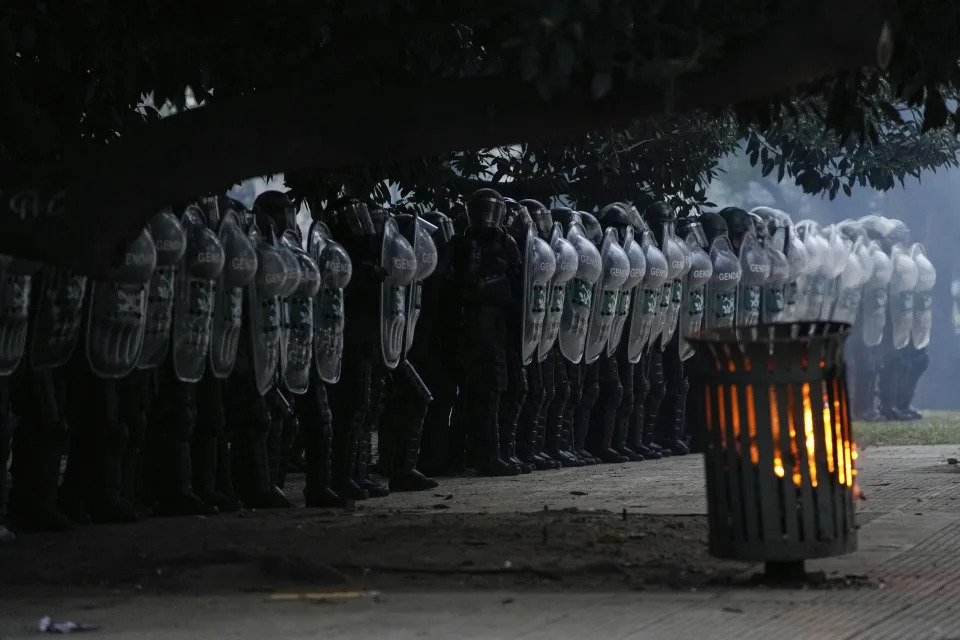

An anti-government protester holds an Argentine flag by police near Congress where lawmakers debate a reform bill promoted by Argentine President Javier Milei in Buenos Aires, Argentina, Wednesday, June 12, 2024.
(AP Photo/Natacha Pisarenko)
BUENOS AIRES, Argentina (AP) — Argentina’s Senate narrowly approved President Javier Milei ’s sweeping proposals to slash state spending and boost his own powers on Thursday, handing the libertarian leader a much-needed first legislative victory.
Milei hailed the vote as a “triumph” even as opposition senators scrapped an income tax package and tweaked some contentious elements after an hourslong debate marred by violent clashes between police and protesters in downtown Buenos Aires.
Senate president Victoria Villarruel, the vice president, used a tiebreaking vote to give provisional approval to Milei’s plans to trim the fiscal deficit, incentivize foreign investment and privatize some state-owned companies in a bid to transform the bloated Argentine state and overhaul its long-troubled economy.
The most critical parts of Milei’s legislation went on to pass a marathon article-by-article voting session that stretched into Thursday morning.
His party made some tough concessions, agreeing not to sell off Argentina's flagship airline Aerolíneas Argentinas, post office or public media company, leaving just a handful of state-owned firms, such as Argentina’s nuclear power company, on the block for possible privatization. A measure lowering the income tax threshold to include thousands more workers also failed to pass the second round of Senate voting, complicating Milei's fiscal consolidation plans.
The Senate’s changes to the state overhaul bill now face a final vote in the lower house. But after months of legislative pushback, it’s likely that the version approved by senators will become law.
As senators clashed over the bill inside Congress on Wednesday, thousands of protesters poured into the streets outside, burning cars and throwing Molotov cocktails as hundreds of federal security forces pushed back with rounds of tear gas and water cannons.
The passage gave a major boost to Milei, a populist outsider who rode to power stridently attacking the establishment but has found it impossible to enact deep reforms without making compromises in Argentina’s opposition-dominated Congress. Milei's 3-year-old party, Liberty Advances, holds just 15% of seats in the lower house and 10% of the Senate.
“Tonight is a triumph for the Argentine people and the first step toward the recovery of our greatness,” Milei posted on X, formerly Twitter, calling his bills “the most ambitious legislative reform of the last 40 years.”
As the sole leader since Argentina’s return to democracy in 1983 not to pass a law within his first six months as president, Milei has struggled to break the legislative impasse that has raised doubts about his governability and unnerved investors otherwise enthused by his libertarian agenda.
Analysts said the bill's advance was enough, at least in the short term, to reassure jittery markets that Milei's agenda has enough supporters to survive Argentina's mounting political chaos and social unrest. Argentina sovereign bond yields jumped on news of the approval Thursday.
But the opposition has vowed to keep fighting and the plans passed with a razor-thin majority remain riddled with uncertainties.
“The Milei government showed it's in a political learning curve, which is positive for investors and markets whose main concern is how much of his reform promises will materialize," said Marcelo J. García, Americas director at geopolitical risk firm Horizon Engage. "But he'll need to engage in issue-by-issue dialogue to implement at least part of his reform agenda.”
For nearly 21 hours, lawmakers haggled over the 238-article state reform bill, unpicking some parts but passing Milei’s highly divisive declaration of a one-year state of emergency and delegation of broad powers to the president in energy, pensions, security and other matters until the end of his term in 2027.
In a reflection of the governing party’s weakness, Villarruel again used a casting vote to approve Milei's expanded powers after a 35-35 tie.
Other articles seen as controversial that passed include an incentive scheme that would give investors lucrative tax breaks for 30 years.
His vision marks a stark reversal from that of the left-leaning Peronist movement, aligned with former leftist president Cristina Fernández de Kirchner, which has run vast budget deficits financed by printing money for much of the last two decades.
The spending cuts and currency devaluation that Milei has delivered have, at least in the short term, hit the populace hard — exacerbating a recession, increasing poverty to 55% and driving annual inflation toward 300%, among the highest in the world.
The pain has tested the patience of ordinary Argentines still waiting to see the promised benefits of his reforms, including stable currency, tamer inflation and fresh foreign investment.
Katarina Hall
Thu, June 13, 2024

Santiago Oroz / SOPA Images/Sipa USA/Newscom
Argentine President Javier Milei's comprehensive reform package was narrowly approved in the Senate late on Wednesday, as protests against his measures turned violent in Buenos Aires.
Following an 11-hour debate, senators voted 37–36 in favor of Milei's tax reforms and an omnibus bill. The motion was initially tied 36–36, but Vice President Victoria Villarruel, the head of the chamber, cast the decisive vote.
"For those Argentines who suffer, who wait, who do not want to see their children leave the country…my vote is affirmative," Villarruel said.
Last December, Milei introduced his extensive reform package, aimed at deregulating and reforming several sectors, including labor, commerce, real estate, and health care. The bill also proposes a declaration of "a public emergency in economic, financial, fiscal, pensions, defense, tariff, energy, health, administrative, and social matters until December 31, 2025." It seeks to privatize numerous state-owned enterprises.
However, the bill faced an uphill battle in Congress, where Milei's party is in the minority. The bill was rejected in February and was approved in a modified form in late April, reducing the number of articles from over 600 to 232.
During the Senate voting, some of the bill's elements were also removed, including the plan to privatize the state-run airline, Aerolíneas Argentinas.
During his first six months in office, Milei has not managed to pass any legislation. So far, he has relied on his executive power to deregulate the Argentine economy and cut public spending. Yesterday's successful vote represents an initial legislative victory for the president.
The bill still requires voting on each individual article—a process that is expected to last through Thursday night—before facing a final vote in the lower house. However, at this point, its implementation is highly likely.
After the vote, the president's office released a statement claiming the reforms were a step toward abandoning "policies of failure and misery," positioning Argentina "on the path to prosperity and growth."
Meanwhile, thousands of people gathered outside the National Congress building, protesting against Milei's shock measures and urging senators to reject his proposals. The protesters chanted, "Our country is not for sale!" and "We will defend the state!"
The protests escalated into violence, with clashes between the police and demonstrators. Protesters threw sticks, stones, and Molotov cocktails at police. Others set overturned cars on fire. According to the minister of justice and security for the city of Buenos Aires, Waldo Wolff, one protester was found "with a grenade."
In response, riot police used water cannons, pepper spray, and tear gas to disperse crowds. More than a dozen protesters have been arrested.
The violence resulted in injuries, with at least 20 police officers and five opposition lawmakers receiving medical attention. The lawmakers were pepper sprayed by police during the confrontation and were transported to the hospital, according to the Peronist party Unión por la Patria.
Milei's office condemned the protests, calling the demonstrators "terrorists" who were "attempting to carry out a coup d'état" by disrupting Congress.
"The only thing the old guard knows how to do is put spokes in the wheel," Milei said on Wednesday at a conference in Buenos Aires. "We are going to change Argentina, we are going to make it the most liberal country in the world."
The post Javier Milei's Tax and Omnibus Bills Narrowly Pass Argentine Senate appeared first on Reason.com.
Argentine Senate passes Milei reform bill as protests rage outside
BUENOS AIRES, Argentina (AP) — Argentina’s Senate narrowly approved President Javier Milei ’s sweeping proposals to slash state spending and boost his own powers on Thursday, handing the libertarian leader a much-needed first legislative victory.
Milei hailed the vote as a “triumph” even as opposition senators scrapped an income tax package and tweaked some contentious elements after an hourslong debate marred by violent clashes between police and protesters in downtown Buenos Aires.
Senate president Victoria Villarruel, the vice president, used a tiebreaking vote to give provisional approval to Milei’s plans to trim the fiscal deficit, incentivize foreign investment and privatize some state-owned companies in a bid to transform the bloated Argentine state and overhaul its long-troubled economy.
The most critical parts of Milei’s legislation went on to pass a marathon article-by-article voting session that stretched into Thursday morning.
His party made some tough concessions, agreeing not to sell off Argentina's flagship airline Aerolíneas Argentinas, post office or public media company, leaving just a handful of state-owned firms, such as Argentina’s nuclear power company, on the block for possible privatization. A measure lowering the income tax threshold to include thousands more workers also failed to pass the second round of Senate voting, complicating Milei's fiscal consolidation plans.
The Senate’s changes to the state overhaul bill now face a final vote in the lower house. But after months of legislative pushback, it’s likely that the version approved by senators will become law.
As senators clashed over the bill inside Congress on Wednesday, thousands of protesters poured into the streets outside, burning cars and throwing Molotov cocktails as hundreds of federal security forces pushed back with rounds of tear gas and water cannons.
The passage gave a major boost to Milei, a populist outsider who rode to power stridently attacking the establishment but has found it impossible to enact deep reforms without making compromises in Argentina’s opposition-dominated Congress. Milei's 3-year-old party, Liberty Advances, holds just 15% of seats in the lower house and 10% of the Senate.
“Tonight is a triumph for the Argentine people and the first step toward the recovery of our greatness,” Milei posted on X, formerly Twitter, calling his bills “the most ambitious legislative reform of the last 40 years.”
As the sole leader since Argentina’s return to democracy in 1983 not to pass a law within his first six months as president, Milei has struggled to break the legislative impasse that has raised doubts about his governability and unnerved investors otherwise enthused by his libertarian agenda.
Analysts said the bill's advance was enough, at least in the short term, to reassure jittery markets that Milei's agenda has enough supporters to survive Argentina's mounting political chaos and social unrest. Argentina sovereign bond yields jumped on news of the approval Thursday.
But the opposition has vowed to keep fighting and the plans passed with a razor-thin majority remain riddled with uncertainties.
“The Milei government showed it's in a political learning curve, which is positive for investors and markets whose main concern is how much of his reform promises will materialize," said Marcelo J. García, Americas director at geopolitical risk firm Horizon Engage. "But he'll need to engage in issue-by-issue dialogue to implement at least part of his reform agenda.”
For nearly 21 hours, lawmakers haggled over the 238-article state reform bill, unpicking some parts but passing Milei’s highly divisive declaration of a one-year state of emergency and delegation of broad powers to the president in energy, pensions, security and other matters until the end of his term in 2027.
In a reflection of the governing party’s weakness, Villarruel again used a casting vote to approve Milei's expanded powers after a 35-35 tie.
Other articles seen as controversial that passed include an incentive scheme that would give investors lucrative tax breaks for 30 years.
His vision marks a stark reversal from that of the left-leaning Peronist movement, aligned with former leftist president Cristina Fernández de Kirchner, which has run vast budget deficits financed by printing money for much of the last two decades.
The spending cuts and currency devaluation that Milei has delivered have, at least in the short term, hit the populace hard — exacerbating a recession, increasing poverty to 55% and driving annual inflation toward 300%, among the highest in the world.
The pain has tested the patience of ordinary Argentines still waiting to see the promised benefits of his reforms, including stable currency, tamer inflation and fresh foreign investment.
Katarina Hall
Thu, June 13, 2024

Santiago Oroz / SOPA Images/Sipa USA/Newscom
Argentine President Javier Milei's comprehensive reform package was narrowly approved in the Senate late on Wednesday, as protests against his measures turned violent in Buenos Aires.
Following an 11-hour debate, senators voted 37–36 in favor of Milei's tax reforms and an omnibus bill. The motion was initially tied 36–36, but Vice President Victoria Villarruel, the head of the chamber, cast the decisive vote.
"For those Argentines who suffer, who wait, who do not want to see their children leave the country…my vote is affirmative," Villarruel said.
Last December, Milei introduced his extensive reform package, aimed at deregulating and reforming several sectors, including labor, commerce, real estate, and health care. The bill also proposes a declaration of "a public emergency in economic, financial, fiscal, pensions, defense, tariff, energy, health, administrative, and social matters until December 31, 2025." It seeks to privatize numerous state-owned enterprises.
However, the bill faced an uphill battle in Congress, where Milei's party is in the minority. The bill was rejected in February and was approved in a modified form in late April, reducing the number of articles from over 600 to 232.
During the Senate voting, some of the bill's elements were also removed, including the plan to privatize the state-run airline, Aerolíneas Argentinas.
During his first six months in office, Milei has not managed to pass any legislation. So far, he has relied on his executive power to deregulate the Argentine economy and cut public spending. Yesterday's successful vote represents an initial legislative victory for the president.
The bill still requires voting on each individual article—a process that is expected to last through Thursday night—before facing a final vote in the lower house. However, at this point, its implementation is highly likely.
After the vote, the president's office released a statement claiming the reforms were a step toward abandoning "policies of failure and misery," positioning Argentina "on the path to prosperity and growth."
Meanwhile, thousands of people gathered outside the National Congress building, protesting against Milei's shock measures and urging senators to reject his proposals. The protesters chanted, "Our country is not for sale!" and "We will defend the state!"
The protests escalated into violence, with clashes between the police and demonstrators. Protesters threw sticks, stones, and Molotov cocktails at police. Others set overturned cars on fire. According to the minister of justice and security for the city of Buenos Aires, Waldo Wolff, one protester was found "with a grenade."
In response, riot police used water cannons, pepper spray, and tear gas to disperse crowds. More than a dozen protesters have been arrested.
The violence resulted in injuries, with at least 20 police officers and five opposition lawmakers receiving medical attention. The lawmakers were pepper sprayed by police during the confrontation and were transported to the hospital, according to the Peronist party Unión por la Patria.
Milei's office condemned the protests, calling the demonstrators "terrorists" who were "attempting to carry out a coup d'état" by disrupting Congress.
"The only thing the old guard knows how to do is put spokes in the wheel," Milei said on Wednesday at a conference in Buenos Aires. "We are going to change Argentina, we are going to make it the most liberal country in the world."
The post Javier Milei's Tax and Omnibus Bills Narrowly Pass Argentine Senate appeared first on Reason.com.
Nicolás Misculin and Eliana Raszewski
Updated Wed, June 12, 2024

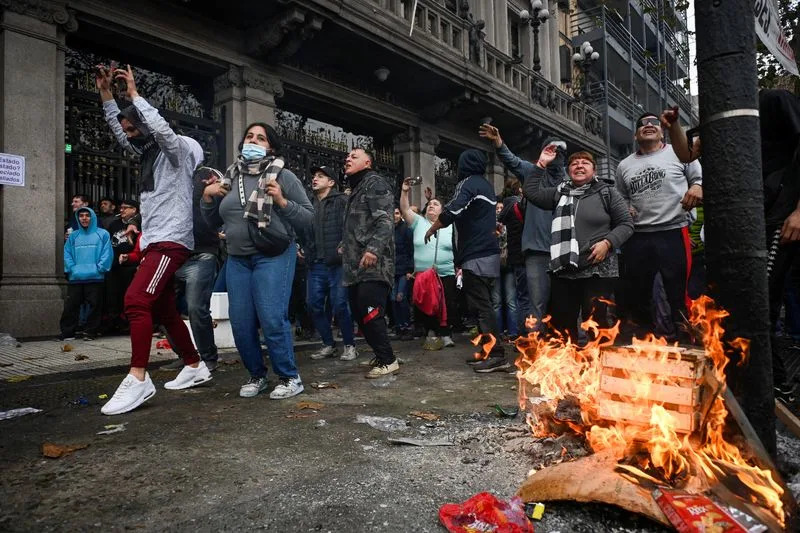
By Nicolás Misculin and Eliana Raszewski
BUENOS AIRES (Reuters) -Argentina's Senate passed a sprawling bill on Wednesday that is key to libertarian President Javier Milei's economic reform plans, while protesters set fires and clashed with police in the streets outside Congress.
The upper house was divided down the middle over the bill, which was passed in a general vote after the head of the chamber, Vice President Victoria Villarruel, broke the 36-36 tie.
The bill passed after a marathon debate, with senators now set to vote on each article of the package designed to boost investment by privatizing state entities and providing incentives for businesses.
The bill initially passed the lower house of deputies in April, but will now head back for another vote following changes in the Senate.
"Today there are two Argentinas," Villarruel said as she voted in favor of the reform. "A violent Argentina that sets a car on fire, throws rocks and debates the exercise of democracy, and another Argentina with workers waiting with great pain and sacrifice for the change that they voted for."
Milei's government, which controls only a minority of seats in both chambers, had been bargaining to win over allies. It knew the bill would face changes, but had been hoping to at least eke out the general approval.
The main left-leaning Peronist opposition bloc, closely allied to the unions, had voted down what is known as the "bases" bill, with voting still pending on a separate fiscal package.
The bill is key to Milei's plans to overhaul an embattled economy, with inflation near 300%, and includes plans for privatizing public firms, granting special powers to the president and spurring investment.
But some protestors fear it would leave them further exposed to rising unemployment and consumer prices.
"Argentine people's lives are at play. We've drunk this poison several times: to have zero inflation with zero economic activity," protester and social leader Luis D'Elia said as thousands protested the planned reforms.
"This poison has failed several times in Argentina and we won't allow this to carry on."
Reuters footage from the streets of Buenos Aires showed a car ablaze, with scattered protesters throwing rocks and bottles, while police with riot gear used tear gas, water hoses and rubber bullets.
Milei's office celebrated the bill's passage.
"What happened tonight is a triumph for the Argentine people and the first step to recovering our greatness," the presidential office said in a statement.
'CHANGE ARGENTINA'
Milei, a brash economist and former pundit who has clashed with lawmakers and regularly called Congress a "nest of rats," has tied a lot to the bill. His government says it is key to undoing a major economic crisis that it inherited.
"We are going to change Argentina. We'll make a liberal Argentina," Milei said on Wednesday, adding that if his reforms didn't get through Congress now he'd try again in 2025.
A government official speaking on condition of anonymity said that they expected the bill to get the Senate's general approval, but that it would be "more altered than we would like."
The passage of the "bases" bill will "accelerate the growth process, mainly by getting investment into the country," the person said.
Argentina has annual inflation near 300%, myriad capital controls that stymie business and trade, depleted foreign currency reserves and a high debt load that needs servicing. The economy is in recession and poverty is rising.
(Reporting by by Nicolás Misculin and Eliana Raszewski; Additional reporting by Sarah Morland; Writing by Kylie Madry; Editing by Adam Jourdan, Rod Nickel, Sandra Maler, Leslie Adler and Michael Perry)
Protesters and police clash in Argentina as Congress debates Milei’s reform bill
Osmary Hernández, Mauricio Torres, CNNE, and Michael Rios, CNN
Wed, June 12, 2024
Police in Argentina clashed Tuesday with anti-government protesters outside Congress, where senators were scheduled to debate a bill on government and economic reforms proposed by libertarian President Javier Milei.
A CNN en Español team on the ground witnessed police using water cannons and tear gas to disperse the crowd, while protesters were seen hurling objects back at police.
A car belonging to a TV station was overturned and set on fire before it was extinguished by firefighters.
So far, there are no official reports of injuries, but CNNEE journalists witnessed paramedics helping injured people.

A demonstrator reacts during a protest near Argentina's National Congress, on the day senators debate President Javier Milei's economic reform bill, in Buenos Aires on June 12. - Mariana Nedelcu/Reuters
Demonstrators from various social groups and unions had gathered there to voice their opposition to the proposed reforms.
The bill – which has already been approved in the Chamber of Deputies – includes a declaration of a “public emergency in administrative, economic, financial and energy matters for a period of one year,” which would delegate legislative powers in those areas to the Executive Branch without having to go through Congress.
Clashes erupt in Buenos Aires as Senate debates controversial reforms
DPA
Wed, June 12, 2024

Police gathers to disperse protesters as they demonstrate against the Basic law that is being discussed by the National Senate. There were violent clashes with police.
DPA
Wed, June 12, 2024

Police gathers to disperse protesters as they demonstrate against the Basic law that is being discussed by the National Senate. There were violent clashes with police.
Paula Acunzo/ZUMA Press Wire/dpa
Demonstrators and police clashed outside Argentina's Congress on Wednesday as senators were discussing a controversial reform package that proposes to privatize several state entities in a move slammed as neoliberal by critics.
Hooded demonstrators hurled stones and incendiary devices at officers in Buenos Aires, while police deployed batons and tear gas. Several cars went up in flames and around 20 suspects were arrested, according to broadcaster TN.
The office of Argentina's far-right, libertarian President Javier Milei congratulated security forces in a post on X for their "excellent actions in repressing" what it said were "terrorist groups" who had allegedly been attempting a "coup."
Inside congress, senators were discussing a reform package put forward by Milei's government which provides for the privatization of several state-owned companies, tax breaks for large investors and labour market and tax reforms, among other things.
The left-wing opposition and social movements have slammed the package as neoliberal and unfair, and the government has had to significantly curtail its proposals to be able to get backing in parliament.
Argentina has been gripped by a severe economic crisis for years. Annual inflation recently skyrocketed to almost 290%, one of the highest levels worldwide.
Milei's government recently cut thousands of jobs in the public sector, reduced subsidies and wound up social programmes, triggering demonstrations.
Critics say Milei's harsh austerity programme is plunging many people into poverty and is putting the country's future at risk.
Around 56% of people in the once prosperous country live below the poverty line, according to the Pontifical Catholic University of Argentina.
The second largest economy in South America suffers from a bloated state apparatus, low industrial productivity and a large shadow economy that deprives the state of much tax revenue.

Police gathers to disperse protesters as they demonstrate against the Basic law that is being discussed by the National Senate. There were violent clashes with police. Paula Acunzo/ZUMA Press Wire/dpa

Protesters and security forces clashed throughout the afternoon in the surroundings of the National Congress. Social organizations, leftist political parties, human rights organizations, neighborhood assemblies, and unions gathered in rejection of the Base Law, currently being debated in the Senate. The project includes a labor reform that takes away workers' rights, a change in the retirement regime, privatizations of public companies, and more. Daniella Fernandez Realin/ZUMA Press Wire/dpaMore

A protester dressed as Argentine president Javier Milei joins a demonstartion against the Basic law that is being discussed by the National Senate. There were violent clashes with police. Paula Acunzo/ZUMA Press Wire/dpa

Police gathers to disperse protesters as they demonstrate against the Basic law that is being discussed by the National Senate. There were violent clashes with police. Paula Acunzo/ZUMA Press Wire/dpa

Protesters gathered to demonstrate against the Basic law that is being discussed by the National Senate. There were violent clashes with police. Paula Acunzo/ZUMA Press Wire/dpa

Protesters gathered to demonstrate against the Basic law that is being discussed by the National Senate. There were violent clashes with police. Paula Acunzo/ZUMA Press Wire/dpa
Demonstrators and police clashed outside Argentina's Congress on Wednesday as senators were discussing a controversial reform package that proposes to privatize several state entities in a move slammed as neoliberal by critics.
Hooded demonstrators hurled stones and incendiary devices at officers in Buenos Aires, while police deployed batons and tear gas. Several cars went up in flames and around 20 suspects were arrested, according to broadcaster TN.
The office of Argentina's far-right, libertarian President Javier Milei congratulated security forces in a post on X for their "excellent actions in repressing" what it said were "terrorist groups" who had allegedly been attempting a "coup."
Inside congress, senators were discussing a reform package put forward by Milei's government which provides for the privatization of several state-owned companies, tax breaks for large investors and labour market and tax reforms, among other things.
The left-wing opposition and social movements have slammed the package as neoliberal and unfair, and the government has had to significantly curtail its proposals to be able to get backing in parliament.
Argentina has been gripped by a severe economic crisis for years. Annual inflation recently skyrocketed to almost 290%, one of the highest levels worldwide.
Milei's government recently cut thousands of jobs in the public sector, reduced subsidies and wound up social programmes, triggering demonstrations.
Critics say Milei's harsh austerity programme is plunging many people into poverty and is putting the country's future at risk.
Around 56% of people in the once prosperous country live below the poverty line, according to the Pontifical Catholic University of Argentina.
The second largest economy in South America suffers from a bloated state apparatus, low industrial productivity and a large shadow economy that deprives the state of much tax revenue.

Police gathers to disperse protesters as they demonstrate against the Basic law that is being discussed by the National Senate. There were violent clashes with police. Paula Acunzo/ZUMA Press Wire/dpa

Protesters and security forces clashed throughout the afternoon in the surroundings of the National Congress. Social organizations, leftist political parties, human rights organizations, neighborhood assemblies, and unions gathered in rejection of the Base Law, currently being debated in the Senate. The project includes a labor reform that takes away workers' rights, a change in the retirement regime, privatizations of public companies, and more. Daniella Fernandez Realin/ZUMA Press Wire/dpaMore

A protester dressed as Argentine president Javier Milei joins a demonstartion against the Basic law that is being discussed by the National Senate. There were violent clashes with police. Paula Acunzo/ZUMA Press Wire/dpa

Police gathers to disperse protesters as they demonstrate against the Basic law that is being discussed by the National Senate. There were violent clashes with police. Paula Acunzo/ZUMA Press Wire/dpa

Protesters gathered to demonstrate against the Basic law that is being discussed by the National Senate. There were violent clashes with police. Paula Acunzo/ZUMA Press Wire/dpa

Protesters gathered to demonstrate against the Basic law that is being discussed by the National Senate. There were violent clashes with police. Paula Acunzo/ZUMA Press Wire/dpa
Argentina’s riot police clash with protesters in capital’s streets over president Javier Milei’s reforms
Namita Singh
THE INDEPNDENT
Thu, June 13, 2024
Thu, June 13, 2024
Riot police in Argentina unleashed water cannons and fired tear gas outside the National Congress building in Buenos Aires at protesters opposing state overhaul and tax bills proposed by president Javier Milei.
However, the Senate approved the sweeping reforms, delivering an initial legislative victory to the libertarian leader in his efforts to deliver on his promises of radical change.
The Senators voted 37 to 36 late Wednesday to give their overall approval to the overhaul bill after 11 hours of heated debate as protesters urging lawmakers to reject Milei’s harsh austerity measures clashed with the police outside Congress.
The lawmakers still must approve individual measures in an article-by-article vote that will stretch throughout the night.
The legislation delegates broad powers to the president in energy, pensions, security and other areas and includes several measures seen as controversial, including a generous incentive scheme for foreign investors, tax amnesty for those with undeclared assets, and plans to privatise some of Argentina’s state-owned firms.

Riot police use pepper-spray on demonstrators during a protest outside the National Congress in Buenos Aires on 12 June 2024 (AFP via Getty Images)
The bill – already approved in the Chamber of Deputies – includes a declaration of a “public emergency in administrative, economic, financial and energy matters for a period of one year”, giving legislative powers to Executive Branch and would not need the approval of the Congress, reported CNN Espanol.
If the Senate approves the articles with modifications, the lower house still has to okay them before Mr Milei can claim passing his first law since entering office last December.
Earlier, a carnival atmosphere prevailed around Congress as protesters blasted trumpets, dancing and buying beer and grilled meat from impromptu street barbecues. However, it quickly turned violent as crowds jostled and shoved against a column of police armed with shields and batons.

A demonstrator affected by tear gas is assisted during a protest in Buenos Aires on 12 June 2024 (AFP via Getty Images)
Police used pepper spray to clear a line of demonstrators, sending at least five opposition lawmakers to the hospital, according to the left-wing Peronist party, Unión por la Patria.
“A sad day for Argentinian democracy,” said a social media account of the party. “Absolute repudiation of the repression perpetrated by the police”.
Scenes of chaos played out in streets surrounding the central square as demonstrators from different social groups voiced their protest against the proposed reforms.

A riot police officer fires his gun during clashes with demonstrators near the National Congress in Buenos Aires on 12 June 2024 (AFP via Getty Images)
The presidency issued a statement condemning the protesters as "terrorists" who "tried to mount a coup d’etat by attacking the normal functioning of the Argentine National Congress".
"The only thing the old guard knows how to do is put spokes in the wheel," Mr Milei said on Wednesday at a conference for a right-wing think tank at the Hilton Hotel in Buenos Aires. "We are going to change Argentina, we are going to make it the most liberal country in the world."
The fiery right-wing economist rose to power on promises he would resolve Argentina’s worst economic crisis in two decades, with annual inflation climbing toward 300 per cent and a recession deepening.
But his political party of relative novices holds just a tiny minority of seats in Congress and he has struggled to strike deals with the opposition.
Senators approved two bills, a tax package that lowers the income tax threshold and a 238-article state reform bill that passed the lower house of Congress in late April after weeks of negotiations.

Demonstrators clash with riot police during a protest near the National Congress in Buenos Aires on 12 June 2024 (AFP via Getty Images)
Initially dubbed the "omnibus bill" because of its more than 600 articles, the watered-down version at hand still delegates broad legislative powers to the president in energy, pensions, security and other areas.
Certain touchy subjects, such as unions’ provision of health care and the privatisation of Argentina’s national oil company, have been scrapped in hopes of reaching a compromise.
Unlike previous Argentine leaders since the return of democracy in 1983, Mr Milei has failed to pass a single piece of legislation during his first six months in office. Instead, the populist outsider has relied on executive powers to slash state spending and sweep away economic restrictions.
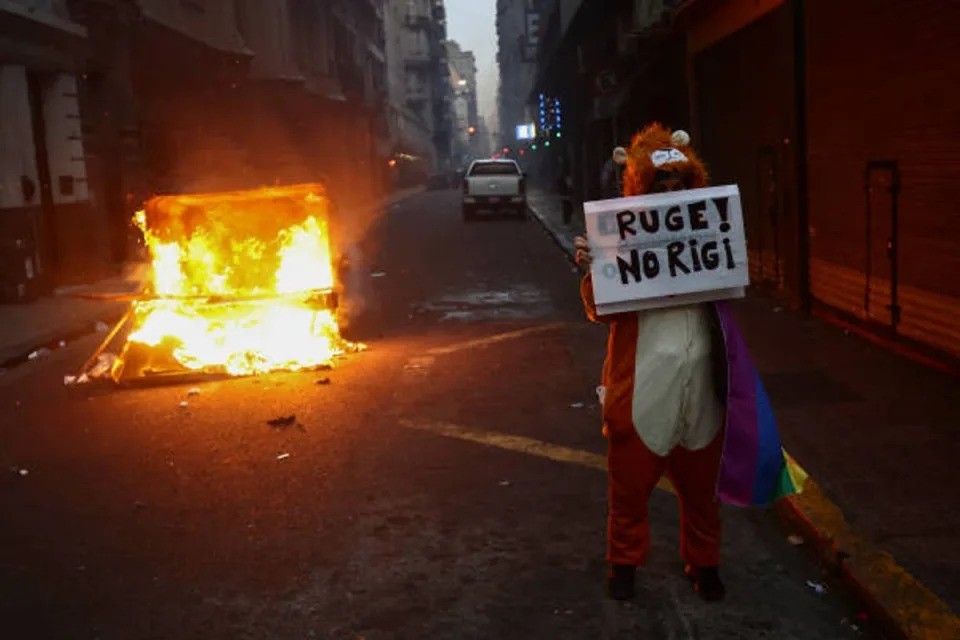
A demonstrator hold a sign against the new incentive regime for large investments included in President Milei’s reforms in front of a barricade on fire during a protest near the National Congress in Buenos Aires on 12 June 2024 (AFP via Getty Images)
Launching fireworks and chanting, "Our country is not for sale!" bankers, teachers, truckers and workers from a slew of other trade unions held signs mocking Mr Milei for his self-proclaimed "anarcho-capitalist" agenda and drastic efforts to slash spending across the state. "How can a head of state hate the state?" one banner read.

Demonstrators march during a protest near the National Congress in Buenos Aires on 12 June 2024 (AFP via Getty Images)
Analysts say that foreign investors and the International Monetary Fund, to which Argentina owes a staggering $44bn, are closely watching Wednesday’s vote to see whether Mr Milei can build consensus with his opponents to deliver on his ambitions.
Sovereign bonds have tumbled. The country’s currency, the peso, has depreciated as well, widening the gap between the official and black market exchange rate to nearly 40 per cent. The peso was trading at 1,255 per greenback on the informal market on Wednesday, a rate far lower than earlier this year.
Even as the IMF has praised Mr Milei’s agenda and released tranches of frozen loans, the fund has held back from striking a new deal with Argentina.
Additional reporting by agencies
No comments:
Post a Comment